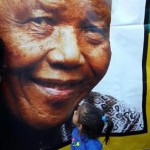If Islam is the fastest growing religion in the world, the fastest growing religion in African countries may be Christianity. In Nigeria, it is so rare to see or hear news of women converting to any religion other than Christianity that when it does happen, the initial assumption is that the conversion must have been forced. Interestingly I did a simple search on conversions to Islam in Nigeria, on scanning the first couple of pages a trend became clear. Where it was women converting, the element of coercion was always there, yet the only time I came across a media article on men converting to Islam, it was because they were being paid – one report said “bribed” – after converting to Islam.
Why there seems to be an overwhelming association of women converts to Islam with coercion in Nigeria may have to do with the intersection of Islamophobia and a paternalism that sees women as incapable of making their own decisions.
A few weeks ago, it was reported that Boko Haram, a terrorist group based in Nigeria, was kidnapping young women, forcing them to convert to Islam on pain of death, and marrying them. This was based on the testimony of a 19-year-old girl, Hajja, who was kidnapped by the group and had to undergo a forced conversion, and a government official who insists that other teenage girls are been held by Boko Haram and presumably forced to become Muslim. It remains to be confirmed if Hajja’s case is unique or if there are indeed more Christian girls in Northern Nigeria who have been kidnapped by Boko Haram. However, this is the second time the Nigerian news reported on a woman being kidnapped and “enticed” into becoming a Muslim. While I am not attempting to discount Hajja’s harrowing experience, I find it interesting that the times I’ve come across women converting to Islam in the Nigerian media, there is always the suggestion of compulsion, even when the story has little to do with experiences like Hajja’s.
Sometime in August, there was news of a woman who had been reportedly been forcefully converted to Islam and then kidnapped and held in the palace of a traditional and Muslim ruler, the Etsu Nupe. That woman, Aisha Uzoechina, made headlines, and the case around her conversion grew to involve several religious institutions in Nigeria, including the Christian Association of Nigeria, the traditional ruler and the Sharia Court. The daughter of a pastor at one of the largest and most influential churches in Nigeria, Aisha Uzoechina, in her own words, did not feel safe around her father, and so sought protection from the Etsu Nupe, the Sharia Court and other Islamic organisations in Nigeria, fearing that her father would react violently towards her becoming Muslim. Yet the prevailing media response placed emphasis on her father Pastor Raymond Uzoechina, who alleged that there were women other than his daughter who had also been kidnapped and “hypnotised” in order to become Muslim at the Etsu Nupe’s palace. This was after the pastor had paid a visit to the palace, where he had apparently been shown legal documents proving proving Aisha Uzoechina’s voluntary change of faiths.
Mainstream comments on the situation were horrendous, and no surprise, the story of a pastor’s daughter kidnapped and forced to accept Islam made it way though to the Islamophobic parts of the web. There was the expected uproar at what the media presented as a forced conversion; eventually the government of the state had to intervene out of fear that a religious clash between Muslims and Christians may occur… all over the conversion of one woman. There was hardly any mention of Aisha Uzoechina’s right as an adult to do what she pleases; rather, she was portrayed as a confused girl who ran away from home into the clutches of Muslims and Islam. Similarly ignored was the threat her father posed; according to Aisha Uzoechina, her father threatened to kidnap her and take her to a place where no one would find her. When she came out to tell her story in her own words, in an interview with the Weekly Trust, she did not receive the same wide audience.
The last we heard of the case was the Christian Association of Nigeria apologising due to the Etsu Nupe being “misrepresented in the media,” with Aisha Uzoechina’s father explaining away his allegations. Apparently he needed someone to blame for his daughter’s actions and chose the person who she had taken refuge with.
These two stories of forceful conversion that reached the media within six months of each show certain things about Nigeria: for one, that regardless of any of the other circumstances related to the story, it is easier to believe a Christian woman was forced to convert to Islam than to believe that it is a choice that she made. In the times when women converting to Islam popped up in the media, they were both framed as forceful, even though only one genuinely was. The stories also indicate that women converting to Islam in Nigeria tend to be wrapped in controversy when in the Nigerian media. Eren recently noted that “conversion stories are nothing that should be in the news,” yet while indeed forced conversions do happen, in the Nigerian media, the triple combination of “woman”, “religious conversion” and “Islam” is always politically charged. So even when a woman chooses Islam on her own, there is no guarantee that her conversion will be private or personal.












